John Janaro's Blog, page 42
December 8, 2023
Immaculate Conception and the “Days of Mary”
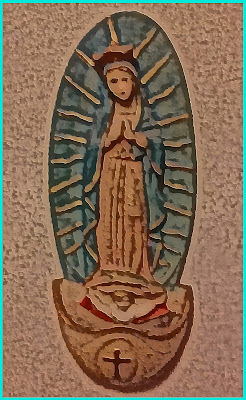 The Solemnity of the Immaculate Conception begins the “days of Mary” in the Advent calendar, especially for the land and peoples of “The Americas.” These next four days celebrate the profound “common vocation” of the inhabitants of the Western Hemisphere and its “land” from Alaska to Tierra Del Fuego, which John Paul II called “America” in the singular, indicating the fundamental solidarity of everyone in this land, and the special significance of the Virgin of Guadalupe who began its evangelization nearly 500 years ago from the geographical center of this “America,” in Mexico City.
The Solemnity of the Immaculate Conception begins the “days of Mary” in the Advent calendar, especially for the land and peoples of “The Americas.” These next four days celebrate the profound “common vocation” of the inhabitants of the Western Hemisphere and its “land” from Alaska to Tierra Del Fuego, which John Paul II called “America” in the singular, indicating the fundamental solidarity of everyone in this land, and the special significance of the Virgin of Guadalupe who began its evangelization nearly 500 years ago from the geographical center of this “America,” in Mexico City.Today we celebrate with joy the perfect, supereminent work of grace and redemption that is Mary, the All-Holy One, free from all sin from the beginning of her existence by virtue of the foreseen redeeming sacrifice of her Son.
Here is a portion of today’s prayer from Pope Francis:
“The world changes if hearts change; and everyone must say: starting with mine. But only God can change the human heart with his grace: the one in which you, Mary, you are immersed from the first moment; the grace of Jesus Christ, our Lord, that you generated in the flesh, who died and rose again for us, and who you always point out to us. He is salvation, for every man and for the world. Come, Lord Jesus! May your kingdom of love, justice and peace come! Amen!”
December 7, 2023
The Conversion of Saint Ambrose
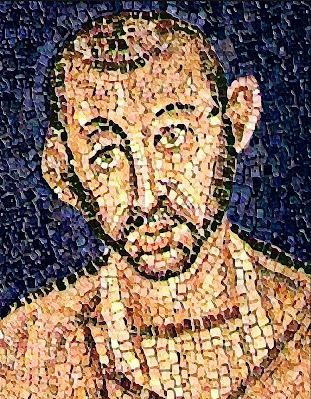 December 7 is the feast of Saint Ambrose, and his story really is a great conversion story. Here is the text that appeared in my column in the February 2019 issue of Magnificat:
December 7 is the feast of Saint Ambrose, and his story really is a great conversion story. Here is the text that appeared in my column in the February 2019 issue of Magnificat:In the fourth century, Roman society was in a difficult transition from a thousand years of paganism (that had shaped its laws and modes of governance) to the newly “official” Christianity of Emperor Constantine and his successors. Many Romans in powerful positions became merely nominal Christians, and some even tried to manipulate the Church. Others were sincerely convinced of the truth of the Gospel, but saw difficulties in reconciling that conviction with their political position in the society of late antiquity.
Aurelius Ambrosius was one of the latter people. He was born in Trier in Gaul (where his father was Imperial Prefect) around 340, into a family of Roman nobility that also had a Christian lineage. He was given a thorough education in preparation for a political career. Though enrolled as a catechumen, he was not baptized in his youth. Wealthy Christian families in Rome generally delayed the baptism of their children, and men committed to government service often remained catechumens indefinitely, as exercising worldly power seemed incompatible with the demands of Christian living.
Ambrose rose to become Governor of Milan. Although he knew the basics of Christianity, tried to live an upright life, and was known and respected for his fairness and equanimity, Governor Ambrose was not ready for baptism even as he approached middle age. As far as he could see, his office required him to belong to what was still a pre-Christian world and to use the sometimes brutal means of that world when necessary.
Still, he had no taste for violent measures. Ambrose preferred persuasion, and he excelled at it. During his governorship, the affairs of the Church in Milan were in an uproar as the upholders of Nicene orthodoxy battled against the Arian party. After the (Arian supporting) bishop died in 374, partisans of both sides nearly rioted over who would succeed him. Governor Ambrose was compelled to intervene to restore the peace. Instead of calling in soldiers, however, he spoke to the people of Milan about the necessity of concord.
Here God’s grace was mysteriously at work. Even as the governor’s words brought the people together, the Holy Spirit inspired within them an unusual but prophetic intuition and desire: that Governor Ambrose himself should become their new bishop. They took up the cry, “Ambrose for bishop!” This was not, however, what the still-unbaptized Emperor’s consul had expected. He resisted what was ultimately a call for his own conversion. In the days that followed, he tried to convince the people that he unworthy of being a bishop. He was a civil official who had used torture and shed blood. He was weighed down with worldly riches. He was bound to the Emperor’s service. When the people continued to insist, Ambrose fled the city and went into hiding. But they sent an appeal to the Emperor himself and received his approval.
Only then did Ambrose lay down the burden of his worldly office. The call of Jesus Christ surrounded him from every side, and he realized that it was time to say, “Yes.” He was baptized on November 30, 374 and was ordained bishop a week later, on December 7. He put aside Imperial power to become a shepherd, and thereafter he dedicated all his intelligence, eloquence, and judiciousness to preaching Christ and serving His Church.
December 3, 2023
Advent 2023: “Rend the Heavens and Come Down”

We begin Advent 2023 begging for the omnipotence and goodness of the Infinite Mystery to “rend the heavens and come down” to rescue us from our sins. We have forgotten the love of God, yet He remains our merciful Father and we are all the work of His hands.
“Oh, that you would rend the heavens and come down, with the mountains quaking before you, while you wrought awesome deeds we could not hope for, such as they had not heard of from of old. No ear has ever heard, no eye ever seen, any God but you doing such deeds for those who wait for him. Would that you might meet us doing right, that we were mindful of you in our ways! Behold, you are angry, and we are sinful; all of us have become like unclean people, all our good deeds are like polluted rags; we have all withered like leaves, and our guilt carries us away like the wind. There is none who calls upon your name, who rouses himself to cling to you; for you have hidden your face from us and have delivered us up to our guilt. Yet, O Lord, you are our father; we are the clay and you the potter: we are all the work of your hands” (Isaiah 64:2-7).
December 2, 2023
“December Horizons” 2023
“December Horizons” are mosaics of color and light with the sun setting in the afternoon and the trees—now mostly bare—translucent and open to the spaces beyond them.
(#JJStudios #DigitalArt)

November 29, 2023
Meeting “The Smallest Janaro” ❤️

“The Kids” (by which I mean John Paul and Emily) are back and settled in at home with Maria and Anna and Emily’s Mom. We were able to meet the new little “Princess of Janaroland,” who is (so far) a rather quiet girl. She is, after all, a newborn baby… but if she’s your granddaughter, the smallest movements are thrilling and endearing.
At first we thought, “gosh, she looks just like the newborn Maria did in 2021,” but that’s not exactly true. But we do have lots of girls in this family (which I think is wonderful), and I look forward to watching them grow and at least begin their vocational paths in this life.
In the pictures below, Anna probably just looks like any other newborn baby. But she is precious to us, and I love her little face especially when she opens her eyes.
We have various pictures here: Papa holding Anna (above), and then (below) Nana holding Anna (personally, I think these grandchildren are blessed to have such a beautiful, tender, intelligent, and wise Nana as Eileen Janaro😘). Then there are “mug shots” of Anna, images from the “young Janaro family’s” domestic life, and images of Maria with her sister. Maria is so cute with her sister. She chatters away at Anna like she does with the rest of us, but she’s perplexed (maybe?) because the baby doesn’t respond or interact with her yet.
Don’t worry, Maria, you will both (God willing) have a lifetime of interpersonal exchanges ahead of you—all kinds of “communication” growing up and beyond. You’ll laugh, you’ll cry, you’ll share secrets, you’ll have sisterly fights (which can angry sometimes, but you will grow closer if you forgive each other); you’ll have joys and sorrows and perhaps live through historical times that I can’t possibly imagine; you’ll pray together, you’ll steal each other’s clothes, you’ll discover and learn to pursue what matters most in life, you’ll share books and music and videos and vacations and food and games and chores and lots of other experiences growing up together. May the Lord bless you with a happy childhood! Papa and Nana pray that they’ll get to see you grow up, to help you and love you, and share gratitude and joy with you.
Maria and Anna Janaro, we love you both so much! (And we love your parents too!!)
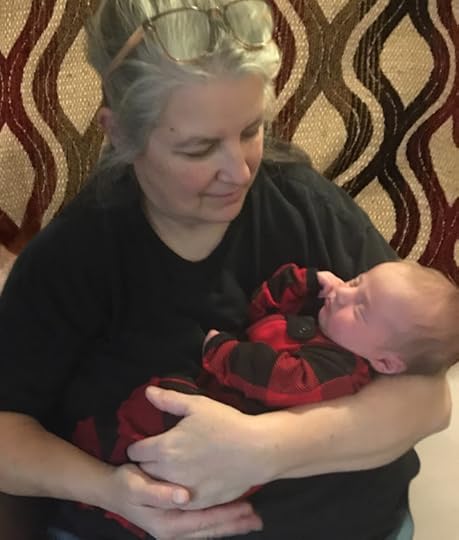



November 28, 2023
Baby Anna, Born November 28th
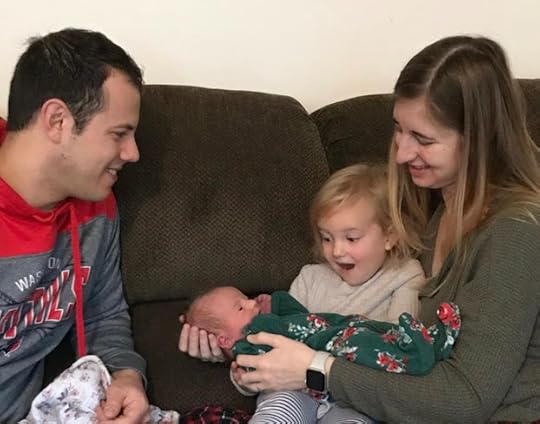
Introducing Anna Rose Janaro !
Born November 28, 2023, at 1:15 PM (Eastern Standard Time), weighing in at just under 8 pounds.
Everyone is fine, as you can see. Big sister Maria is thrilled!☺️ “Papa and Nana” are over the moon, needless to say.☺️☺️❤️❤️ Stay tuned for more pictures!‼️
November 27, 2023
Why Don’t We “Care For One Another”?
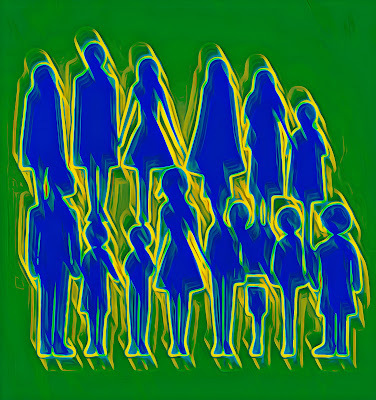 Why don’t we care for one another?
Why don’t we care for one another? We barely seem to care about one another, except insofar as another can serve to facilitate the grasping of the all-consuming-self that demands to occupy the center of the stage in each of little dramas of our little human lives.
This may seem too negative a way of putting things, but the more we reflect upon it, the more we begin to see how this attitude is pervasive in society and too often in our own hearts. It’s so easy to make ourselves—our plans, our desires, our fears, and especially our will—the determining measure of all our other relationships and all of reality. We should be grateful if our selfishness “unsettles us,” because this means our humanity has not been entirely anesthetized and suffocated. Our hearts and our human history witness to the central importance of giving and receiving love for the happiness and fulfillment of people. Poor and suffering persons especially have a claim on our attention and active compassion, and they are not rare in this poor world. We find them among the persons who cross our paths every day, the persons who have been most immediately entrusted to us.
In a sense, we are all “poor” in relation to one another—given to one another, in need of being received by one another, meant to help one another. Recognizing this doesn’t take anything away from our responsibilities as persons and communities to care about (and care for) the marginalized, the sick, and the impoverished in the wider sense—those beyond our immediate experience, who are on the margins of our communities, our peoples, and our nations. It’s sad that so many multitudes of people are abandoned and persecuted, that there is so much conflict and violence all over the world, that instead of caring for people we turn them into pretexts for political fighting, power-grasping, and categories within contesting ideological worldviews. But this is not surprising, considering the fact that so often we fail to care for the people right in front of us: spouses, children, parents, extended family, regular relationships that require collaboration and common concern. How can we expect anything like “world peace” when we ignore the needs of those closest to us—when we refuse to “love our neighbor”?
This is how human beings are made to live: taking care of those close to them. Taking care of children—the older generations looking after and mentoring the younger, making out of family-and-community-love a stable place: not splitting up and fleeing from family, mothers and fathers abandoning each other in divorce and then shuttling children back and forth between them, fighting over them, being possessive, manipulating them, dividing the larger family into taking sides with the mother or the father. In the very context in which it is needed most, love is extinguished. This is one of the ways in which people who are interrelated in central, vitally human relationships become alienated from one another.
At the root of the divisiveness that invades our most basic and intimate human relationships is selfishness. This is a fact that most people would be willing to admit. What continues to emerge in affluent societies, however, is a veritable ideology of selfishness that twists the language of human dignity and human rights into a system that destroys persons and relationships.
Ultimately, our society sets up as an Absolute Ideal the “self-sufficient individual” who makes himself by his own choices, who belongs to no one and has no responsibilities other than those he chooses, for as long as he chooses, until he chooses otherwise. This is for many reasons a shallow caricature of the human person, not the least of which is the inherent fragility of the individual—his “choices” are weak, impulse-driven, incoherent, and therefore ultimately subject to the manipulation of those who are stronger, those who hold power in this world.
Disconnected persons—in the name of an excessive exaltation of “individual rights” and self-defined “freedom of choice”—ultimately end up “choosing” to become slaves to the dominant mentality, to those who hold power and who pretend to be able to offer something to the person that he or she cannot give to his or herself. This is because human beings do not make themselves. They are gifts, one to another. They are responsible for one another. They answer to the Source and Fulfillment of their being, the Giver of all things, the One who is the only ultimately adequate choice of their freedom because this One alone is the radical origin of their freedom.
We have this profound reverence for the dignity of human freedom and the need to respect the freedom of every person. But who told us that we are free? If we are nothing more than stuff in a vast universe of stuff, then why should some piece of that stuff that is called “freedom” command any privilege over anything else? In a world of commodities—consumable stuff—that has no meaning beyond the sum of its parts, the only thing that can prevail is power. The inherently meaningless Greater Power absorbs or crushes all lesser powers. The strong prevail over the weak. The rich rob the poor and laugh at them, without a shred of conscience. People lie to one another and manipulative one another to get an advantage.
One of the most insidious lies is the claim that people belong only to themselves, that they must make themselves, that to be “authentic” they must choose (somehow) from within themselves who and what they are, and that their own choices are the sole source of their responsibilities toward other persons. This is not a world of freedom. It’s a world in which love has been laid waste, a world where the human person disintegrates and the most ruthless power prevails.
This is, in more ways than I can bear to think, our affluent Western world today. This is a world in which you don’t love your neighbor, you don’t even know anything about your neighbor (or the long line of neighbors that come and go). All you know about your neighbors is that you need to lock your doors day and night against them.
This is not how human beings are made to live.
November 26, 2023
Jesus Christ Our King and Shepherd

Jesus Christ is King of the Universe, but His reign is not like the vanity of the powers who rule this world. Christ’s kingship is the rule of Infinite Love, the love of the God who creates us, redeems us, and draws us to Himself by the total outpouring of Himself in love on the Cross. He is sent by the Father as the ultimate Gift (“For God so loved the world that He gave His only Son…” [John 3:16] ).
The readings for this year’s feast emphasize the attentiveness, persistence, and particular love of Christ the King, who is our Good Shepherd. The prophet Ezekiel proclaims the Lord’s promise that He Himself will “tend” to the salvation of His people, His “sheep,” and “rescue them” from darkness.
Thus says the Lord: “I myself will look after and tend my sheep. As a shepherd tends his flock when he finds himself among his scattered sheep, so will I tend my sheep. I will rescue them from every place where they were scattered when it was cloudy and dark” (Ezekiel 34:11-12).
Christ’s kingship is full of tender love of a parent for a child. It is “agape”—the love which we too share by the gift of the Holy Spirit, which calls us to participate in Jesus’s reign of self-giving love. People are entrusted to us not so that we might act like we are superior to them, but so that we might serve them in the kingdom in which to serve is to reign. I was reminded of this from a text of Fr Giussani in our reading for the School of Community:
“May you live the experience of a father; father and mother… because each one has to be father to the friends he has around him, has to be mother of the people around about; not giving himself airs, but with real charity. For no-one can be as fortunate and glad as a man and a woman who feel themselves made fathers and mothers by the Lord. Fathers and mothers of all those they meet” (Luigi Giussani).
November 25, 2023
Holidays and Loved Ones: Past, Present, and Future
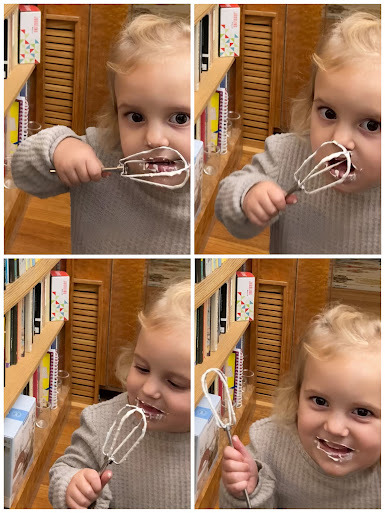 There’s Maria, licking the whipped cream beaters. She called them “lollipops.”
There’s Maria, licking the whipped cream beaters. She called them “lollipops.”A full house and a full table on Thanksgiving 2023, and time with family throughout the weekend, has reminded us in a beautiful way of the abundant gifts in our lives, and all the persons for whom we are most especially grateful.
This whole life is precious, with its foretaste of the joy we long for, and also with its vulnerability, weakness, achievements, struggles, sorrows, consolations, and sufferings—with all the searching that we pursue and endure with wonder and incomprehensible pain.
Trust—the living adherence of faith—seeks “understanding” not so much of theology as a practical awareness of the meaning of reality (wisdom) and a profound awe and gratitude at the realization that everything is gratuitous, that our entire being is a gift. In this moment, as I breathe this breath, everything is gift. Our very selves, and every step of our journey, are generated for us by the Eternal Father who loves us. I know this.
I have decades of convincing experience, of consistently growing existential certainty (a reasonable and “most firm hope”) in which I recognize again and again that following Jesus Christ in the Church corresponds to my true desire for infinite happiness, to the whole scope of my freedom’s aspirations for self-expression, fulfillment, and self-giving love.
And yet, it remains so hard. O Lord, why is it so hard?
I have my own aches and pains and etc. but I will not air laments at this Thanksgiving. The greatness of God’s love permeates the circumstances and expectations of this remarkable time for our family.
These days are full of anticipation, as John Paul and Emily await the birth of their second daughter (any day now!) and Maria continues to be Maria, growing and surprising us every day with her unfolding personality. She doesn’t demand to be the center of attention; in fact she is perfectly capable of keeping herself busy, but when she does “take the stage” she naturally commands everyone’s eyes and ears.
Maria is used to being THE Queen of Everything, and things are going to change, but I think Maria is going to do just fine as a big sister. She is a very self-possessed little person… as long as she gets her way, haha!☺️ She will grow.
The kids are alright. Teresa, our only university varsity sports player, went with her school’s soccer team to the national finals tournament of the USCAA (a league for small university sports programs). Unfortunately, they finished in sixth place, losing both games in the first round. Still, it was an adventure well worth pursuing. Even greater adventures await her next Spring, when she will spend her semester in Rome. Agnese’s health remains stable since Christmas 2021, with the help of medication. Doctors still monitor her and search for the underlying pathology but they don’t know what it is. Thank God she lives a normal and active young-adult life for the most part. Lucia and Mike are in New Jersey, where both of them have become involved in the local Catholic school, where Lucia teaches third grade and Mike has begun to teach part-time while he studies remotely for a Master’s to become a mental health counselor. John Paul continues to move up in his work with an IT provider, while his wife Emily graduated this past Summer from Shenandoah University as a Doctor of Physical Therapy, and has been working with a local practice (from which she is about to begin maternity leave). Eileen has been working this year in the adolescent program at John XXIII Montessori Center, and Josefina is one of her students, pursuing her path toward the high school degree. She is our “last child” at home (at age 17) and the three of us have become particularly close. I don’t know how I shall bear it when she finally leaves home.
The changes in life are beautiful and mysterious.
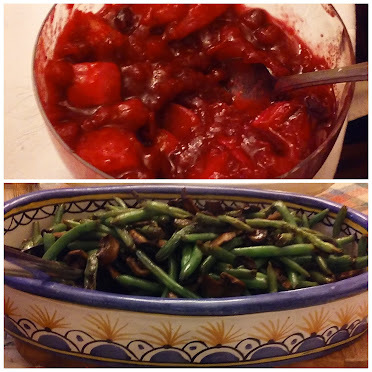 Our table was full this Thanksgiving. My memories were drawn to other tables in other rooms (and, sometimes, restaurants) going back 60 years. It doesn’t seem too long ago that we sat at the kiddie table while the “adults” sat in their exalted places, eating and talking loudly and always laughing for reasons we could never understand. But they were good times. And so many people, generations of people who long ago finished the journey of this life. There were grandparents, aunts, uncles, cousins, and—of course and above all—my father and my mother. Dad and Mom were with us year after year, from my smallest childhood to adolescence and young adulthood to married life with “Papa and Granma” and their cheerful chattery little grandchildren running around. Every year, the kids got bigger and my parents grew older…
Our table was full this Thanksgiving. My memories were drawn to other tables in other rooms (and, sometimes, restaurants) going back 60 years. It doesn’t seem too long ago that we sat at the kiddie table while the “adults” sat in their exalted places, eating and talking loudly and always laughing for reasons we could never understand. But they were good times. And so many people, generations of people who long ago finished the journey of this life. There were grandparents, aunts, uncles, cousins, and—of course and above all—my father and my mother. Dad and Mom were with us year after year, from my smallest childhood to adolescence and young adulthood to married life with “Papa and Granma” and their cheerful chattery little grandchildren running around. Every year, the kids got bigger and my parents grew older…On Thanksgiving 2017 (only six years ago), we were at my parents’ condo in Arlington. Their condo on Glebe Road that once seemed to be one of those “permanent things “ in life has now “vanished.” Today it belongs to someone else, has someone else’s furniture in it, houses someone else—a person or persons I have never met, living in the spaces that my parents lived in for 30 years, where my parents met Eileen for the first time, where all my kids spent so much happy time in their childhood. Thanksgiving 2017 would be our last Thanksgiving together. My father (I realize in retrospect) was already experiencing early symptoms of the dementia that would come full force in the following year. After the meal, as we sat in the living room in various conversations, I saw my father sitting in his chair, looking somewhat withdrawn. Though he was not a man of many words, we had had beautiful conversations through the years. I looked at him and something inside said, “go talk to him.” The only way to get close enough for him to hear me was to sit on the floor next to his chair, which was something of a challenge for me but seemed like a challenge worth taking.
We spoke at great length of many things. He was totally lucid, and recounted with great feeling the sorrow that he had carried with him all through his life due to the loss of both of his parents when he was a child. In those days in New York City (1944-46), there were close knit ethnic neighborhoods and multigenerational interconnected extended families living in close proximity and sticking together. They did it not only to survive in this new country, but also for love. When Dad’s mother died, the family decided that the three children (my father was the youngest) needed to stay together, so they were taken into the grandmother’s house down the street, and they grew up there under her care and with the help of numerous aunts and uncles.
This was a great and good support that my father received, and yet those times—for all their intuitive generosity—had their own limitations and unavoidable ignorance. My father told me that he and his brother and sister were sheltered in every possible way from thinking about their parents’ tragic deaths. This was an understandable and well-intentioned human strategy at a time when little was known about the deeper layers of emotional and psychological wounds and there were so few resources to help people heal and find greater peace. But my 82-year-old father said to me with tears in his eyes on that Thanksgiving Day, “We were never able to grieve. I have never grieved the loss of my parents.”
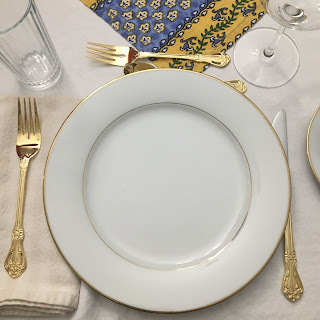 My father was a great man, but he had a certain residual emotional awkwardness on occasion that we usually dismissed as taciturnity or moodiness. Now I wonder whether perhaps there were “emotional pieces” of a lost and traumatized 11-year-old boy buried within him, never able to grow to maturity, always hindered. I do think he was healed and freed very much by the love of his extended family growing up, and then by my mother and even his sons and his grandchildren. But it was still hard. He bore this suffering with much patience and trust in God, and it became fruitful in profound ways, including in the way he cared for his wife and his own children. Now I am beginning to see the quiet heroism in my father’s life.
My father was a great man, but he had a certain residual emotional awkwardness on occasion that we usually dismissed as taciturnity or moodiness. Now I wonder whether perhaps there were “emotional pieces” of a lost and traumatized 11-year-old boy buried within him, never able to grow to maturity, always hindered. I do think he was healed and freed very much by the love of his extended family growing up, and then by my mother and even his sons and his grandchildren. But it was still hard. He bore this suffering with much patience and trust in God, and it became fruitful in profound ways, including in the way he cared for his wife and his own children. Now I am beginning to see the quiet heroism in my father’s life.My Mom once told me that it was only after many years of marriage that she realized why my Dad always seemed “moody” during the holidays. “It was because he missed his parents.”
On Thanksgiving 2023 —though it’s obviously very different, it’s not on the same emotional level as a loss in childhood—I think I understand my father a little better because I feel a touch of melancholy during the holidays because I miss my parents. It’s not from any particular lack of faith (I don’t think). I just miss them. I can’t see them. I can’t hear them. It’s a kind of “wound,” and wounds hurt. I can only offer it to Jesus. He knows what pain is, what my pain is. There is nothing human that fails to find its ultimate meaning in Him.
I pray that my father and mother and all the faithful departed through the mercy of God rest in peace. And I pray for Emily, my beloved daughter-in-law, and her baby girl whom we all await. Grant them a safe and healthy birthing, and all the grace for this new adventure, this new human person, that they have welcomed into their life from the hand of God.
Time, change, patience, love—these make the steps of our journey in this life. As we glimpse that ultimate destination while still on the journey, our hearts are filled with gratitude. And gratitude strengthens us.
Happy Thanksgiving!
November 22, 2023
The 60th Anniversary of the Kennedy Assassination
 Though I don’t remember it, I do know
where I was on that fateful day, sixty years ago
, on November 22, 1963, when we heard ”the news”…
Though I don’t remember it, I do know
where I was on that fateful day, sixty years ago
, on November 22, 1963, when we heard ”the news”… My Mom told me that I was on her lap, crying (for one or more of the multitude of reasons that ten-month-old babies/tots cry). Perhaps I cried harder because I didn’t understand why my mother was crying. I had probably never seen her cry before. But she was only 24-years-old, she was young, full of hope, idealistic, Catholic and American, raised in an Italian immigrant family in New York City. Of course she had aspirations that had been kindled by the mythic stature of John F. Kennedy, a young and (apparently) vigorous President who summoned the post-war generation to “a New Frontier” and entered the space of everyone’s living room through the modern miracle of television. It was a long, long time ago.
Shocked, horrified, distraught, and sorrowful, my mother cried, and as a still-crawling baby I must have been disturbed myself, seeing her cry so much… as she sat with me on her lap, watching the TV…



